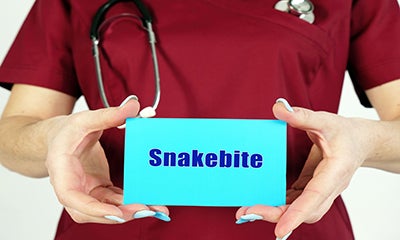Comprehensive Snakebite Program offers multidisciplinary care for snakebite victims
March 22, 2023
Categories: News
Birmingham, Ala. (March 22, 2023) — According to the Centers for Disease Control and Prevention (CDC), 7,000-8,000 people are bitten by venomous snakes each year. But they don’t always get the specialized treatment they need to ensure proper care. That’s why Children’s of Alabama and the University of Alabama at Birmingham (UAB) created their comprehensive snakebite program- one of the nation’s first snakebite follow-up clinics.
“It is really a first of its kind because it is such a multi-disciplinary approach to treating both pediatric and adult snakebite victims,” said Dr. William Rushton, medical toxicologist and the medical director of the Alabama Poison Information Center.
Rushton, one of the program’s co-founders, says when a snakebite victim comes to Children’s, a doctor trained in snakebite management will treat them. Almost all pediatric snakebite victims are moved to a specialized unit at Children's where they are seen by medical personnel with specific training in pain management and wound care.
“I think we are the forefront leaders on how we approach this, and I think that we try to get people out of beds walking as quickly as possible,” Rushton said.
Rushton says that even though the clinic has been accepting patients since 2021, those who work with the clinic are still learning a lot. He says that historically the focus of treatment for snakebites centered around antivenom. However, the Comprehensive Snakebite program has a four-focus model. This means a patient with swollen legs or arms will be assessed by someone trained in that specialty. A patient with large blisters will be evaluated by a specialist who has been trained on how to remove them safely. Patients who have problems with mobility will be referred to physical therapy. Patients who have experienced delayed blood thinning, which Rushton says often occurs with people whom rattlesnakes have bitten, will be screened using specialized laboratory parameters.
Rushton says the response to the clinic has been positive. Last year, the Alabama Poison Information Center received more than 200 calls from across the state about snakes. At least 40 patients were seen in the clinic last year, and those snakebites were primarily from copperheads.
“I think a lot of what we do is provide reassurance and a place for people to turn to when they want to ask questions,” Rushton said. “We sit down with them and go over the expected healing process and how long it will take.”
Rushton says a snakebite patient can often be discharged in less than 36 hours from the time they arrive at Children’s or UAB. Most patients also receive a clinic appointment within three to seven days of being discharged.
The clinic’s reach is not limited to Alabama, and Rushton says people have reached out from Georgia, North Carolina and Tennessee. He says the best way to contact the snakebite follow-up clinic is to call the Alabama Poison Information Center at 1-800-222-1222. A team of poison center specialists is available to answer questions, and they also refer patients to the clinic.
“There are so many people at Children’s who come together to build this program, and I am exceptionally grateful for it,” said Rushton.
For more information on venomous snakes, click here.










